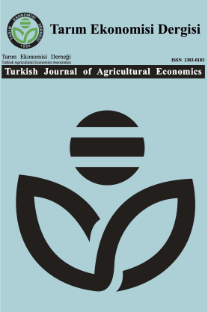İZMİR VE MANİSA’DA İŞLENEN DOMATESİN SOSYAL YAŞAM DÖNGÜSÜ ANALİZİ
Bu çalışma, Türkiye’den ihraç edilen işlenmiş domatesin sektördeki aktörler üzerindeki etkisini Sosyal Yaşam Döngüsü tekniğiyle tahmin etmeye çalışmaktadır. Sosyal Yaşam Döngüsü Analizi (SYDA) daha sürdürülebilir bir üretim-tüketim zinciri için zincirdeki tüm aktörlerin karar verme sürecine yardımcı olabilecek araçlar geliştirmeyi sağlayan ve son zamanlarda çok tartışılan bir yöntemdir. Bu çalışmadaki yöntem, Montpellier’de (Montpellier Üniversitesi1-Cirad-IAMM) Prof. Michel Garrabé tarafından geliştirilmiş olan çoklu sermaye analizi üzerine kurulmuştur. Saha çalışması İzmir ve Manisa illerinde Mayıs-Ağustos 2012 döneminde yapılmıştır. Sonuçlar kurumsal, sosyal, finansal, teknik ve beşeri sermaye göstergeleriyle sunulmuştur. Sonuçlar domatesin yaşam döngüsünde üreticilerin düşük seviyede kapasite artışı yarattığını göstermektedir. Buna karşın salça ve lojistik firmaları özellikle teknik sermaye üzerinde önemli bir kapasite artışı yaratmakta fakat kurumsal ve sosyal sermaye açısından ise bu artış görece daha düşük seviyede gerçekleşmektedir
Anahtar Kelimeler:
Sosyal Yaşam Döngüsü Analizi, işlenmiş domates sektörü, çoklu sermaye analizi, kapasite, sosyo-ekonomik etki
Social Life Cycle Analysis of Processed Tomato in İzmir and Manisa
This paper aims to estimate the impacts of the activity on the concerning actors for the Turkish processed tomato sector using Social Life Cycle Analysis tools. The Social Life Cycle Analysis is a technique of assessment used to develop tools for decision making in order to support a sustainable system along a pathway. The method that is used is recently developed by Prof. Michel Garrabé in Université 1-Cirad-IAMM and is based on the analysis of multiple capitals. The field study is conducted in Izmir and Manisa from May until August 2012. The results are presented according to the indicators of the five capital class, human capital, technical capital, financial capital, social capital and institutional capital. They show that the producers create an increase in the capacity at low level in the tomato paste life cycle. The firms and logistics companies have higher positive impact on the technical capital while creating relatively lower positive impact on the institutional and social capital
Keywords:
Social life cycle anaysis, processed tomato industry, multiple capital analysis, capacity, socioéconomical Impact,
___
- Abak, K., Erkan, O., Eser, B., Halloran, N., Yanmaz, R., Sarı, N., Ekiz H. 2000. Sebze Tarımında 2000’lerde Üretim Hedefleri.http://www.zmo.org.tr/resimler/ekler/d3d9e73 d8b70698_ek.pdf (Erişim: 17 Aralık 2014)
- Abdelhakim, T. 2009. Economie de développement rural : les nouveaux paradigmes, Projet Formder. Formder Yayın, Montpellier.
- Belem, G., 2005. L’analyse du cycle de vie comme outil de développement durable,
- Kabul Tarihi : 31/01/2015
- ISSN: 1303-0183
- Yayın Aralığı: 2
- Başlangıç: 1992
- Yayıncı: Tarım Ekonomisi Dergisi
Sayıdaki Diğer Makaleler
Onur SUNGUR, Recep KOÇ, Murat Ali DULUPÇU
İZMİR VE MANİSA’DA İŞLENEN DOMATESİN SOSYAL YAŞAM DÖNGÜSÜ ANALİZİ
